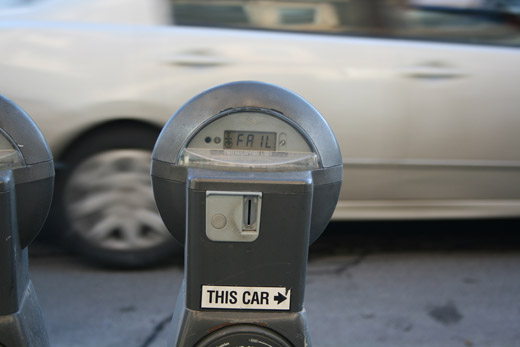
An interesting article over at BLDGBLOG imagines new options for cities facing huge deficits, essentially asking: if you didn’t pay taxes, would you be willing to pay higher fees for service, or would you rather pay even higher sales taxes and have zero fees attached to any municipal use or service?
Could an entire rethinking of city services and tax structure do anything to save a destroyed infrastructure system? Are there economies that depend on the pay per use model (as in, what would the meter reader people do for work in a city with a large lump sum paid once per year)? And, is it inevitable that cities move towards a subscription-based model of service, where you choose a package at a specific price-point for the things you actually use?
Anyways, many questions, but certainly worth a read …
Photo by compujeramey.

Oh come on. Public services are not public services if you’re just going to end up pricing out low-income citizens. It’s a step above full-out privatization but by no means a big one.
Sales taxes also tend to make me a bit nervous (in the States, sales tax reform is generally tied to “flat tax” proposals, which are universally despicable), but property taxes are also a bit problematic, inasmuch as they can prompt people/businesses to relocate just outside city limits to avoid paying them. Some balance between the two would have to be struck, I guess.
I do, however, strongly support steep (I dare say, “punitive”) subscription-like fees for people who live outside the city. If you want to move out to the exurbs, you can pay $150/year for that library card or $3 admission to the park or whatever. City residents get a hang tag for parking downtown, non-residents pay through the nose for one or else pay into the meter like they do now.
Steven, we missed you!
It’s an interesting idea to charge more for the use of city services for non-city residents. It’d likely hugely encourage a larger density in some capacities, and maybe do so specifically through the method of encouragement through urban-perks (like your idea for a hang tag for parking for city residents). Does it not just polarize things though? As in, it may certainly encourage a certain density in whatever core you choose (whether that’s some of the central ward boundaries, or just the city’s limits in general), but also discourage any temporary influx.
Maybe it’s a bad example, but if a certain art institution in the city is already struggling to stay afloat, discouraging regional visitors by increasing fees for entrance or fees for parking or extra taxes in the gift shop would only more rapidly sink it. The power the city can exert over both private and public establishments may be too great, if it were to engage in any sort of out-of-city “tax” or subscription-like fee structure.
You eluded to this, and I agree that I think a kind of encouragement through subsidized service to relocate people towards urban centres would go a long, long way in helping the city get back on track. If you had a break on bus passes, parking, a municipally subsidized break on your phone/internet service or even your rent could help to build a density. So, not necessarily penalizing those who opt to continue living in the exurbs, but to generate a more stable population and guaranteed density for services already underused. Wouldn’t the city’s transit service do better to drive around buses that were filled up, even if 60% of the riders had passes sold to them at a discount tied to their address?